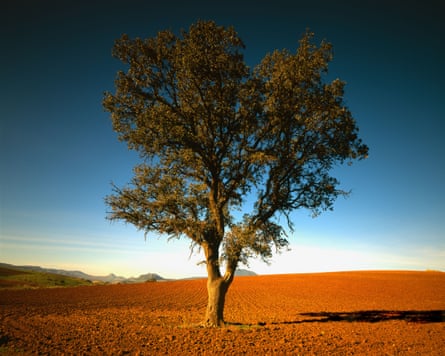They have witnessed – and withstood – much of Spain’s rich history; their thick, gnarled branches steadily supplying olives to a changing roster of Romans, Moors and Christians. But recent years have seen Spain’s thousand-year-old olive trees face one of their biggest threats to date: a growing demand for unique garden ornaments that has led to the trees being uprooted and transported around the world, from northern Europe to the US and the United Arab Emirates.
“We’re losing some of the biggest and oldest trees of Europe,” said César-Javier Palacios of Madrid’s Félix Rodríguez de la Fuente Foundation. The foundation, dedicated to honouring the memory of one of Spain’s best-known naturalists, recently launched a campaign to try and keep these trees in Spain.
In the past two decades, dozens of companies have sprung up across Spain to feed a robust international demand for ancient olive trees. Palacios says the financial incentive was big, with the oldest trees commanding as much as €40,000 (£30,000) on the international market. But the journey is precarious. “Many of them die on the journey,” he said. “And those that don’t die, instead of living maybe another 1,000 years, they may only live another 50 or 100 years.”
A petition launched by his organisation calling on the EU to protect the trees has received more than 140,000 signatures. “Just like 150 years ago, rich north Americans came to Spain to buy Roman shrines for next to nothing and take them back, stone by stone, we’re again allowing the same plundering of our natural heritage,” reads the petition.
The worst part, said Palacios, was that while France and parts of Italy had passed laws to curb the sale of olive trees, in most of Spain the practice remained perfectly legal. “Here it’s the same as if you were selling your car,” he said.

Spain regulates the export of antique cars or historically relevant artworks, recognising their significance to Spanish heritage. “But on these gigantic trees that are unique in the world, there are no limitations,” said Palacios. “These trees are part of our natural heritage, yet we treat them as if they were sculptures, or lampposts, that we can take from one place and put in another.”
The trees are becoming increasingly common imports in Germany, where a 400-year-old tree with a trunk of up to 70-inches can sell for as little as €1,500.
Buyers such as Karl-Heinz Maier, from the village of Willsbach, north of Stuttgart, see the trade as an ecologically friendly alternative to travel. “I no longer need to get on a plane [to see them],” Maier told Agence France-Presse as he showed off his 400 and 120-year-old trees, wrapped in thick plastic and fibre mattress to survive the cold German winters. “I can stay at home and enjoy my olive trees. It’s better for the environment.”
Palacios is hoping the EU will recognise the trees as living history, giving the foundation a starting point from which to try and convince Spanish politicians to do more to protect them. “Imagine someone digging up an ancient yew from a churchyard in the UK and transporting it to a house in Abu Dhabi,” he said. “Nobody would stand for that.”
The region of Valencia is the only place in Spain that has sought to temper the growing trade. In 2006 a law was passed that banned the sale of trees that are more than 350 years old or 6 metres (20ft) in diameter. The restrictions have forced many in the region to find creative alternatives to selling the trees. In the province of Castellón, an outdoor museum invites tourists to tour more than 900 olive trees, all of them more than a thousand years old.
Others have take a cue from the world of wine, where the diminished yields of older vines are increasingly valued for their distinct qualities. In the mountainous zone of Maestrat, the olives from the tangled branches of 437 ancient olive trees – the oldest is said to be 3,000 years old – are pressed to create El Mil extra virgin olive oil. Sold around the world, the olive oil retails for more than €250 per litre.
The initiatives in Valencia stand in stark contrast to the region of Andalusia, whose rolling hectares of olive trees have made Spain the biggest olive oil producer in the world. Lured by fast profits and encouraged by the higher yields produced by younger trees, many farmers have been quick to sell their ancient olive trees. “Today Andalusia has barely any olive trees that are more than 100 years old,” said Palacios.
The campaign has found support in unexpected places. The Olive Tree, an upcoming film by the Spanish director Icíar Bollaín, explores the emotional cost of losing these status symbols. The fictional story follows a young Spanish woman as she criss-crosses Germany, determined to find her family’s thousand-year-old olive tree after its sale leaves her grandfather heartbroken.
The sale of olive trees was a metaphor for Spain’s construction boom, Bollaín told El País during filming earlier this year. “It’s a very concrete way to address something very complex, the speculation with something as basic as a tree and the little respect paid to something that has been in the ground for so long and has been a source of health, wellbeing and pleasure,” she said.
The message is at the heart of Palacios’s campaign. “These are some of the oldest living beings we have on Earth,” he said. “They’ve spent thousands of years in one spot and should be left there.”

Comments (…)
Sign in or create your Guardian account to join the discussion